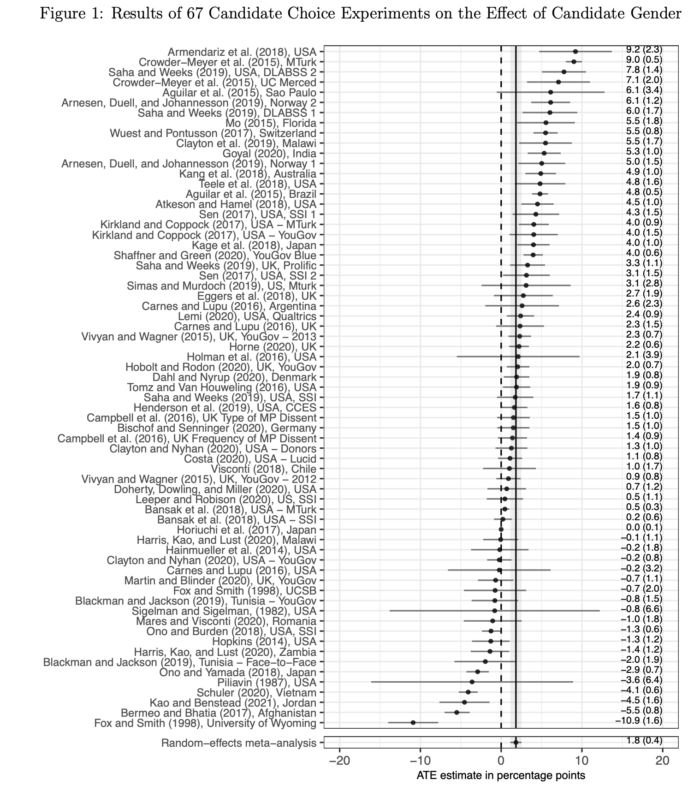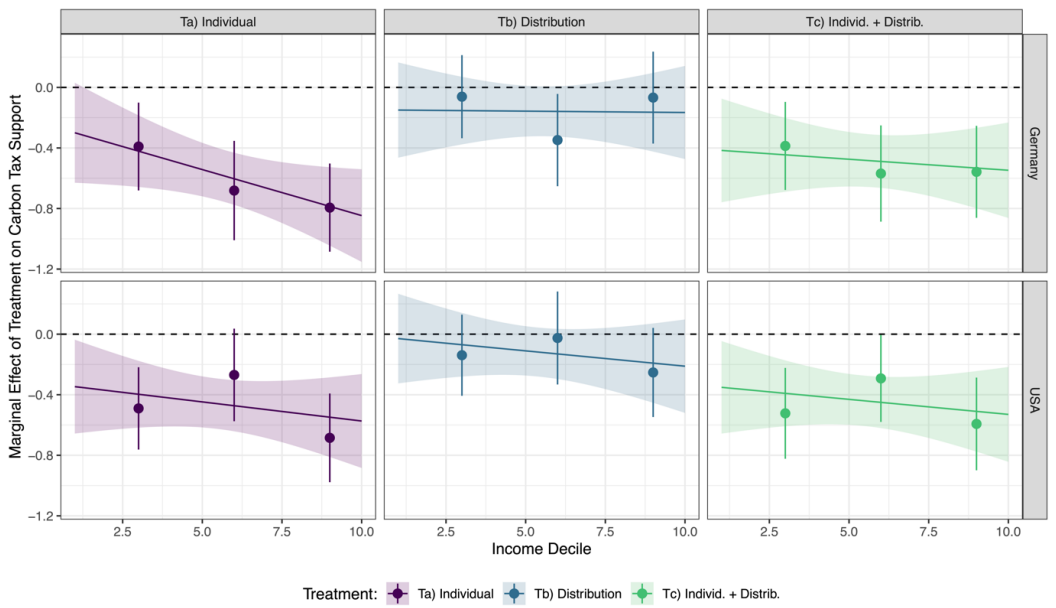Women make up roughly half of the world’s population but hold only 25.7 percent of the elected positions in national legislatures (Inter-Parliamentary Union 2021). Political scientists have long tried to make sense of the persistent underrepresentation of women in politics around the globe. One recurring question in this research canon is whether voters actively discriminate against female political candidates.
In our new study, we revisit this question by integrating the findings from 67 existing survey experiments that studied voter choices. Included in our meta-analysis are factorial or conjoint experiments that randomly altered the ascribed gender of the political candidate presented to survey participants. Our study is based on samples from all over the world although the majority of the experiments were conducted with participants from the United States and Europe.
Using a standardized procedure, we re-analyzed these experiments with respect to candidate gender. The binary outcome of interest is whether or not a survey participant “voted” for the hypothetical candidate presented to them. Using random-effects meta-analysis, we find that on average, voters are approximately two percentage points more likely to support candidates described as women relative to men. Our analysis also indicates that this result is not driven by a few outlier studies. Indeed, in 47 of our 67 samples, the treatment estimates are positive, and of those, 23 are statistically distinguishable from zero.
Figure 1 in the paper summarizes these findings. The graph reports the average treatment effect of being a woman on electoral support for each individual sample in our study and shows the meta-analytic treatment estimate across all samples at the bottom.

But to what extent do candidate and respondent characteristics condition our main finding? In a series of additional tests, we show that the effect of being a woman on electoral support is slightly higher for white vs. black candidates but the difference is not statistically significant. That said, we do find significant differences in support for women candidates across different subgroups of respondents. Women respondents, for example, show significantly stronger support for women candidates than men participants, although for both groups, the treatment estimates are positive overall. Similarly, when restricting our analysis to U.S. samples only, we find that the effect of being a woman candidate is negative among Republicans (-1.4 points) but 3.3 percentage points for Independents and 4.2 points for Democrats.
Overall, our findings offer evidence against pervasive voter distaste for women in politics. Rather than discriminating against women who run for office, voters on average appear to reward women. What then explains the persistent gender gap in political representation across the globe? For us, our findings suggest that institutional barriers that women face when running for office—including party structures and candidate recruitment processes, unequal access to donor networks and campaign finance, and differences in opportunity costs—are correctly coming under greater scrutiny by political scientists.
This blog piece is based on the article “What Have We Learned About Gender From Candidate Choice Experiments? A Meta-analysis of 67 Factorial Survey Experiments” by Susanne Schwarz and Alexander Coppock, forthcoming in the Journal of Politics, April 2022.
The empirical analysis of this article has been successfully replicated by the Journal of Politics and replication materials are available at the The Journal of Politics Dataverse.
About the authors
Susanne Schwarz- Princeton University
Susanne Schwarz is a Doctoral candidate in the Department of Politics at Princeton University. She studies the institutional causes and political consequences of race and gender inequalities in American politics. You can find further information regarding her research on her website and follow her on Twitter @suschwarz.
Alexander Coppock- Yale University
Alexander Coppock is an Assistant Professor of Political Science at Yale University. He studies how individuals incorporate new political information and the reproducibility of social science research. You can find further information regarding his research on his website and follow him on Twitter @aecoppock.


